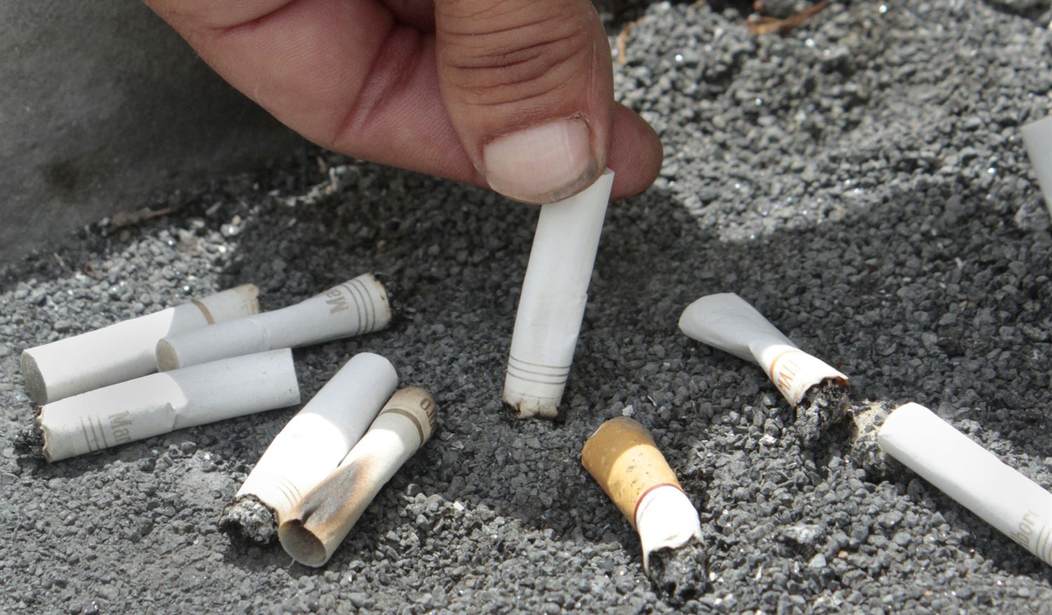“Say, you got a cigarette?”
That question might take on a new meaning if the Biden administration has its way. The Build Back Better framework — in addition to its cringey, clunky name — contains an insidious tax on nicotine products that flies in the face of Biden’s promise not to raise taxes on anyone making less than $400,000 per year.
Democrats claim that this new tax could raise $100 billion of that sweet Build Back Better money. (But wait, weren’t we told that it was supposed to pay for itself?)
Back in September, Brad Palumbo wrote at the Foundation for Economic Education:
Progressive politicians often claim they only want to raise taxes on “the rich.” Yet these proposed taxes would undoubtedly hurt poor and working-class Americans the most. According to the CDC, “people living below the poverty level and people having lower levels of educational attainment have higher rates of cigarette smoking than the general population.” And research shows that low-income people spend a higher percentage of their income on cigarettes.
And it’s not just cigarette smokers who could pay the price. The taxes apply to vape products as well.
Estimates show that the tax may not raise the revenue that the Biden administration claims it will. And — as with every big government program — there’s a massive unintended consequence that could stem from these Build Back Better taxes.
A report from the Tax Foundation demonstrates that when states raise taxes on cigarette products, it leads to black-market conditions. That’s right: like the speakeasies and moonshine runners of the Prohibition era, higher taxes on nicotine products could lead to smuggling.
The Tax Foundation’s Ulrik Boesen writes:
The crafting of tax policy can never be divorced from an understanding of the law of unintended consequences, but it is too often disregarded or misunderstood in political debate, and sometimes policies, however well-intentioned, have unintended consequences that outweigh their benefits. One notable example of this is the ever increasing tax rates on tobacco products. A consequence of high state cigarette excise tax rates has been increased smuggling as people procure discounted packs from low-tax states and sell them in high-tax states. Growing cigarette tax differentials have made cigarette smuggling both a national problem and, in some cases, a lucrative criminal enterprise.
To put two and two together, Build Back Better could lead to criminal activity among the people the gargantuan legislation has pledged to protect.
Related: There’s a ‘Build Back Better’ Song, and It’s as Bad as You Can Imagine
As Brad Polumbo writes in another article at FEE:
Suffice it to say this isn’t a good thing. Black markets fuel criminal activity and lack the same accountability and quality standards of free, legal markets. But fueling the black market is just another unintended consequence of big government meddling with legal markets.
(And look, let’s take the argument out of the equation that people should simply quit smoking. I’ll be the first to make that argument, but even if someone is trying to quit, he or she is going to bear this ridiculous pay-the-tax-or-look-on-the-black-market burden until he or she can shake the addiction to nicotine.)
But don’t forget that Biden repeatedly says he refuses to raise taxes on anyone making less than $400,000 a year — a claim the Washington Post laughably called “accurate.” The Biden administration may not be raising taxes in a literal way, but back door taxes make life harder for poorer Americans and potentially add opportunities for criminal activity to thrive.
It’s not bad enough for inflation to hurt Americans of all income levels; the Biden administration and its congressional Democrat enablers want to hurt smokers even more. For all of Biden and the Democrats’ bluster about wanting to “give America’s working families the tools, choices, and freedom they need to build back better,” they don’t mind sneaking an onerous burden onto the backs of working-class people.










Join the conversation as a VIP Member